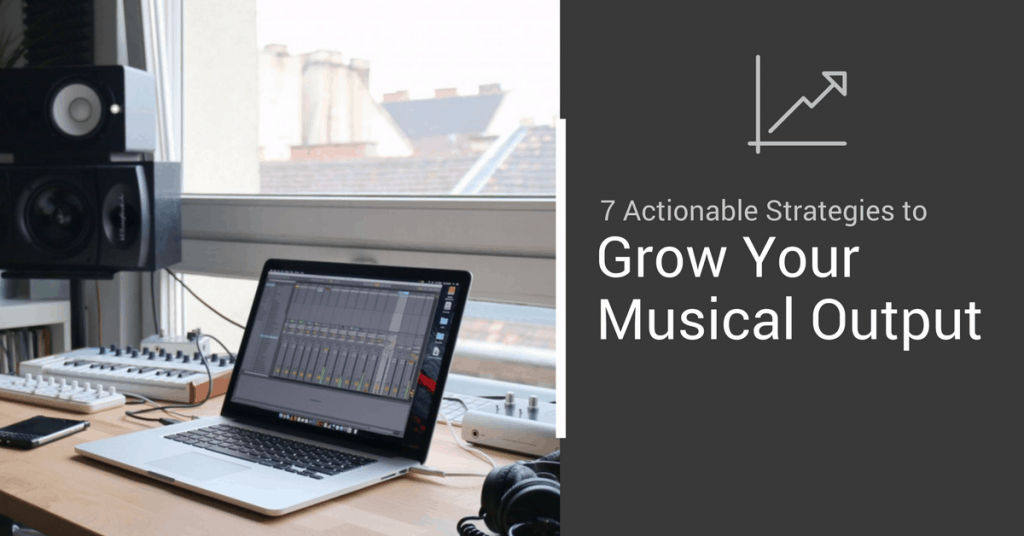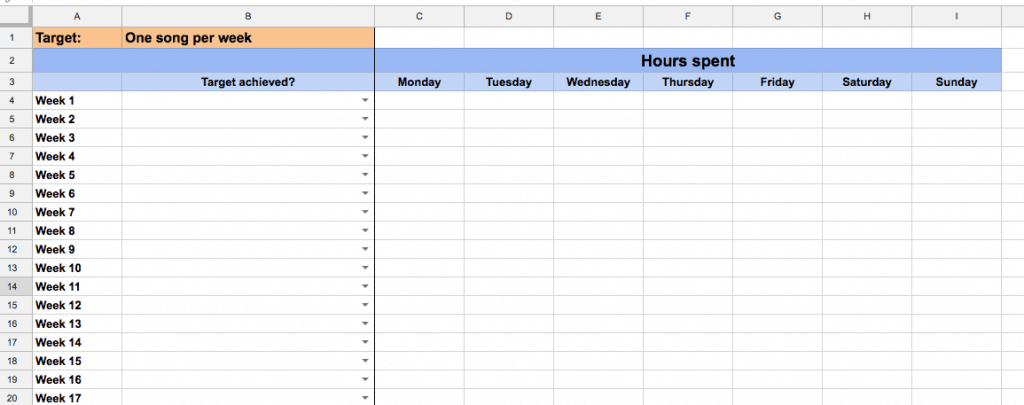Let me guess.
You’ve read somewhere that quantity leads to quality. You know the best thing you can do to improve as a producer is to make more music—to increase your output.
But you’re not sure how to actually do that. You get that you’re supposed to be making more music, you’re just not sure how to make more music.
You still suffer from perfectionism or work too slowly, and you don’t know how to fix that.
Well, there’s no quick hack…
But there are actionable strategies that you can use—starting today—to grow your musical output and finish more music.
Some of the strategies in this post won’t be new to you. You may roll your eyes. Others will surprise you.
Don’t try and implement them all at once. Take just one and try it out. See if it works (I’ll be surprised if it doesn’t). Once it’s in place, add another one to increase your musical output even further.
Freebie: Song Finishing Checklist
Along with the 7 actionable strategies, I’m giving away a free song finishing checklist that you can use to push past that pesky last 10% of a track.
Click the button below to download it.
Alright. Ready? Let’s get into it.
Strategy 1: Set a target
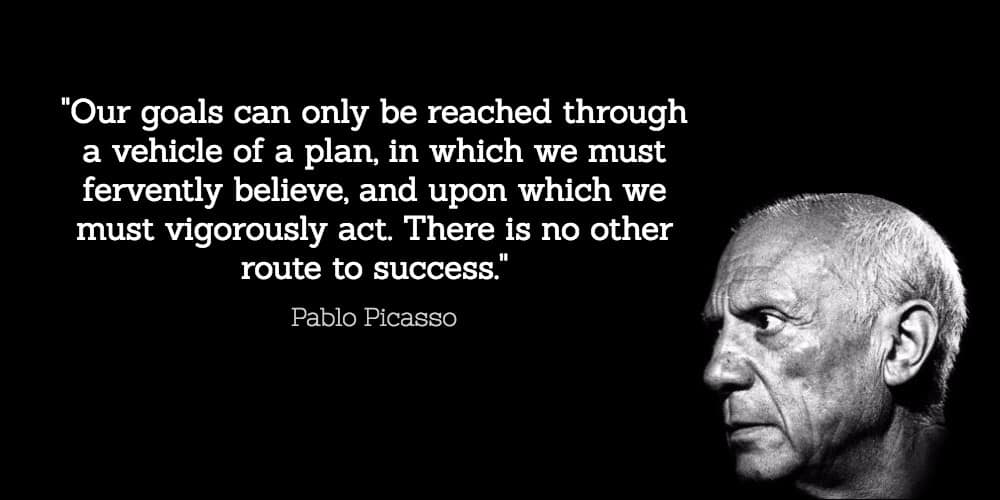
If you want to grow your musical output, setting a target is essential.
You need to set ONE target. ONE recurring goal. Something you can repeat over and over, which, if done, will bring great results.
In other words, your target should not be “create an EP,” because that’s not recurring. A better example would be, “Create one EP per month.”
Your goal should not be “finish a really good song.” Because that has no relation to your level or frequency of output. You could spend 5 years on that goal and you’d still achieve it, but is it smart to do that? No. Instead, a goal like “Create one song per week” will help you increase your output.
Can’t think of a good target to set? Start with just that: finish one song per week.
Track it
Once you’ve set a target, you need a tracking system. How will you know whether you’ve hit your target?
The best system is accountability. If you can find another producer who’s willing to ask you whether you’ve finished a track every week—that’s awesome.
Alternatively, use a spreadsheet and track whether you hit your target for that week or not (bonus points if you enter the time spent on music each day).
Here’s a template you can use.
Now, read this closely…
It’s important you do everything you can (within reason) to reach this target.
It will be hard. At first it will be really hard. But after a while, your confidence and momentum will enable you to enjoy hitting that target, and you’ll feel the satisfaction of having put in the work.
Strategy 2: The Trollope method
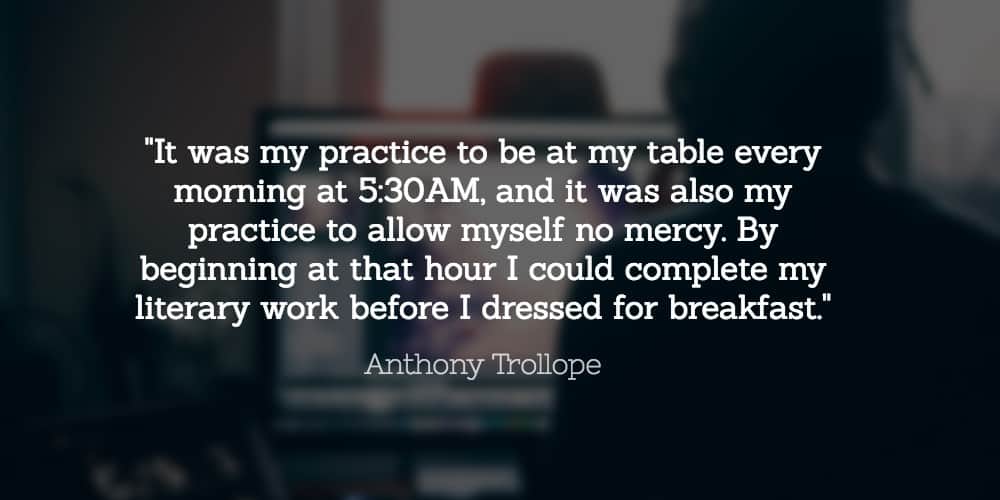
Anthony Trollope wrote over 45 novels in 35 years.
How?
By leveraging the power of tiny milestones.
Trollope would write in 15-minute intervals for three hours each morning. He would aim to write 250 words every 15 minutes, which helped him keep on track…
“It had at this time become my custom,—and is still my custom, though of late I have become a little lenient of myself—to write with my watch before me, and to require of myself 250 words every quarter of an hour…
This division of time allowed me to produce over ten pages of an ordinary novel volume a day, and if kept up through ten months, would have given as its results three novels of three volumes each in the year…”
Trollope added an extra, more achievable layer of satisfaction and sense of accomplishment to the process of book writing.
If a book takes 3 months to write, then you aren’t going to feel the satisfaction of having achieved something until those three months have passed. But if you have a tracking system like Trollope’s, then you can feel that sense of satisfaction continuously, which will help you build momentum.
It’s harder to apply Trollope’s method to music production, as progress on a song is harder to quantity than progress on a book. So make it simple. Your tracking system could be 30-minute blocks spent on music. If you sit there for 30 minutes and focus on music without procrastinating, you’ve won.
Figure out how you can create “tiny wins” in your production workflow. How can you keep track of your work and build momentum? What’s your metric for daily success?
Side note: absolute commitment to time allotted
One extra thing worth mentioning…
If Trollope finished a novel before 8:30 (before his three hours were up), he’d pull out a fresh piece of paper and start working on the next one.
If you have the balls for it, you can apply this to your workflow as well. Maybe you’ve committed to producing for two hours per day. If you finish a track in 30 minutes, don’t let yourself relax. Keep going. This is sacred time. Focus on output. Finish.
Strategy 3: Work on one project at a time
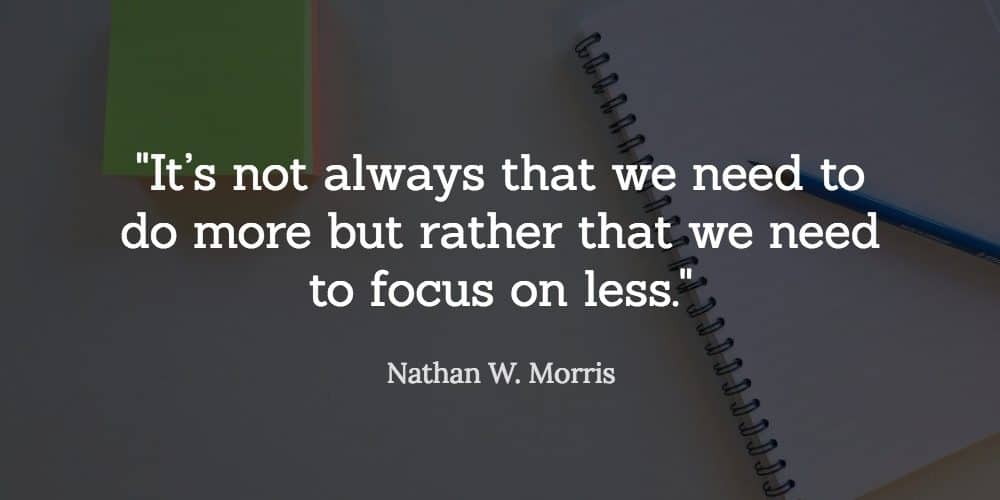
Many producers end up working on multiple projects at once because they start a new project at the first taste of difficulty.
They get 50% through a project, then succumb to the attractive pull of starting something new. After all, it’s more fun to start something new than to push through the mundane and challenging.
But working through the mundane and challenging is often what produces great art.
What it does
When you decide that you’re only going to work on one project at a time, a few things happen…
First, you procrastinate less.
The option to move to another project opens the door to procrastination. But when you’ve committed to working on just one project until completion, that option doesn’t exist. It removes the ability for you to procrastinate by working on something else. You have to struggle through. You have to grind it out.
Second, your subconscious mind will do more work. When you’re only focusing on one project and you encounter a problem, it’s likely that your subconscious will begin processing that outside of production time. The solution to that problem may enter your head at a random point throughout the day.
I’m no scientist, but I imagine if you were working on 5 projects at once, these kind of “Eureka” moments would happen less.
Finally, your learning is balanced. If you consistently abandon projects at 50%, then you’re not developing your skills in a balanced way.
You’re spending a lot of time on songwriting, composition, and sound design. But you aren’t spending as much time on mixing, or on the hard but necessary tweaks and refinements. Your learning is unbalanced.
But when you commit to working on one project at a time. You’re forced to develop your skills evenly.
Strategy 4: Find The Bottleneck
Sometimes, the thing that’s keeping your musical output low is a lack of skill in a particular area.
You have to work out what that area is then develop your skill (or skills) in that are.
If you start projects but abandon them at 30%, then maybe your songwriting, composition and arrangement skills need work.
If you start projects but abandon them at 90%, maybe your mixing skills need work.
Often, it’s going to be something more specific. Perhaps you have no clue how to write a chord progression or write a melody on top a chord progression. That’s a specific skill you can learn in a day or two.
For learning how to systematically remove bottlenecks, I recommend reading John McIntyre’s post on the CODA loop: How To Produce Professional Music Within 12 Months (Instead of 4+ Years…)
Strategy 5: Create a checklist

Checklists help:
- Ensure high production quality…
- indicate when it’s time to move on to the next stage of your track (or indicate when your track is finished)…
- you work more mechanically when you’re feeling uninspired/uncreative.
Let’s look at these each individually.
Ensure production quality
In any given project, there are tens—if not hundreds—of small things you need to get right.
Does the kick and bass relationship work? Is there enough micro-tension in the track? Does each section flow well? Is there an obvious instrument focus for each main section in the track? Is my mix well-balanced?
…and so on.
Trying to keep all of this in your head is futile. It’s better to have a system—in this case, a checklist—that you can consult.
By consulting your checklist and working through it, you don’t miss anything out. Your production quality is more consistent. It doesn’t mean every song you put out will be a hit, but it does ensure a base level of quality that may not exist otherwise (if trying to keep everything in your head).
Indicate completion
The second thing a checklist does is indicate stage or track completion.
If you use my song finishing checklist and find you can’t check all the boxes, then your song probably isn’t finished. If you can check all the boxes, it’s likely finished. Move on to the next one.
This also helps you suppress your bias and assumptions.
For instance, you may spend 20 hours on a song and assume that it’s close to being finished because… well… you’ve spent 20 hours on it.
But the time you spend on a project doesn’t necessarily correlate to its quality or how near it is to completion.
Likewise, you may spend 2 hours on a song and assume it’s nowhere near finished, because someone told you years ago that “no producer can finish a song in 2 hours.”
But the checklist will counter these biases and assumptions. It will help you take a more objective look at your project and work through what you need to work through in order.
Which brings me to my next point…
Work mechanically and systematically
One of the most common struggles among producers is pushing through the last 10% of a track.
It’s hard. You’ve done all this work. You’ve struggled through some difficult parts. But it still doesn’t feel finished. There’s something missing. There’s something not quite right.
A checklist reveals what’s missing. Sometimes it’s just one little thing—maybe you need to improve the transition from your chorus to bridge—other times it’s a lot of things.
Without a checklist, you’re playing a guessing game. You haven’t got anything on paper. It’s hard to just sit down and make progress.
But when you have a checklist, you can identify exactly what needs to be done. You can work through it like you would using a to-do list. It becomes easier. You can work mechanically—less consciously—fixing little things here and there until your project is finished.
Strategy 6: Systematize Feedback
Feedback is important. But you already know that.
Most producers go about getting their feedback in a casual manner. They aren’t deliberate about when they get their feedback, who they get it from, and how they ask for it.
This casual approach lowers output.
So what should you do instead?
Be systematic about it.
Decide on how much feedback you want and need
If you’ve been producing for a few months, it’s likely you’ll need more feedback than someone who’s been producing for 10 years. Your ear is still developing, and you won’t pick up on as many errors as someone more experienced.
Decide at which points you want feedback
Do you want feedback only after you’ve finished the song to the best of your ability? Do you want feedback pre-mixdown? Or do you want feedback at multiple stages during your project (idea/loop, rough arrangement, etc.)?
Finally, create a system for implementing the feedback you receive.
It could be as simple as a notepad and pen. Just do something with it. You want to act on the feedback you receive.
Strategy 7: Think like a CEO

Answer these questions on a regular basis:
What’s the most important thing I can do right now?
What’s the one thing you can do, right now, to move your track forward?
Should you really be tweaking that synth plugin? Or should you be writing a melody.
When you work on the most important thing (which usually happens to be the most difficult), you build self-esteem. You make progress. You feel the track coming together.
But when you waste time on unimportant trivial things in your project, you feel unproductive, you lose confidence, and your output lowers.
What is NOT necessary?
Do you really need to be using 50+ tracks in every project?
Do you need to be layering 5 pianos?
Find your hidden assumptions and habits. Assess them. Are they really necessary or helpful, or are they just slowing you down?
What can you delegate to a later time?
If you bounce between 5 different tasks in a project, you’ll work slowly.
In other words, when you’re writing a melody, write a melody. Don’t mix it.
When you’re designing a sound, design a sound. Don’t arrange your song.
There are exceptions to this. Sometimes it pays to mix as you go, or tweak a sound as you’re writing your melody. Electronic music production isn’t rigid. It’s holistic, and it allows for this blurring and merging of processes.
But often—and especially if you want to work fast—you’ll want to delegate things to a later time.
It might mean processing your synth sound after you’ve finished the basic arrangement for your track (as the arrangement is more important), or mixing your kick and bass after youv’e written your chord progression.
In essence: work proactively not reactively. If you feel an urge to do something, ask yourself whether it needs to be done right now. If not, write it down and come back to it.
Note: you can also delegate to other people. I haven’t touched on it here because most of you reading this won’t have that luxury. But if you want to delegate mixing and mastering, go right ahead. There are plenty of producers who just write and arrange but do nothing more.
What processes can be optimized/automated?
Are there 15 things you do every time you start a project? Consider making a default template.
Do you need to design sounds all the time, or could you use presets?
Are there effect combinations you use often? Consider saving an FX chain that can easily be re-used.
Stop Waiting For Your Musical Output to Grow By Itself
If you’re not deliberate about this, it won’t happen.
You can’t just believe that you’ll finish more music and then expect it to happen.
You need to take action.
And now you can. You know 7 strategies you can use to grow your musical output that aren’t dependent on your skill level, collection of plugins, DAW, household income, marital status or coffee preference.
No more excuses. Choose one of the strategies above and implement it in your current project.
Once you’ve got it down, layer another strategy on top to increase your output even further.
And remember…
Growing your musical output is one of the best things you can do as a producer. You’ll develop your skills faster, gain more traction, and feel better about yourself.
Before you go, make sure to download my Song Finishing Checklist to finish more music.
[x_author title=”About the Author”]

